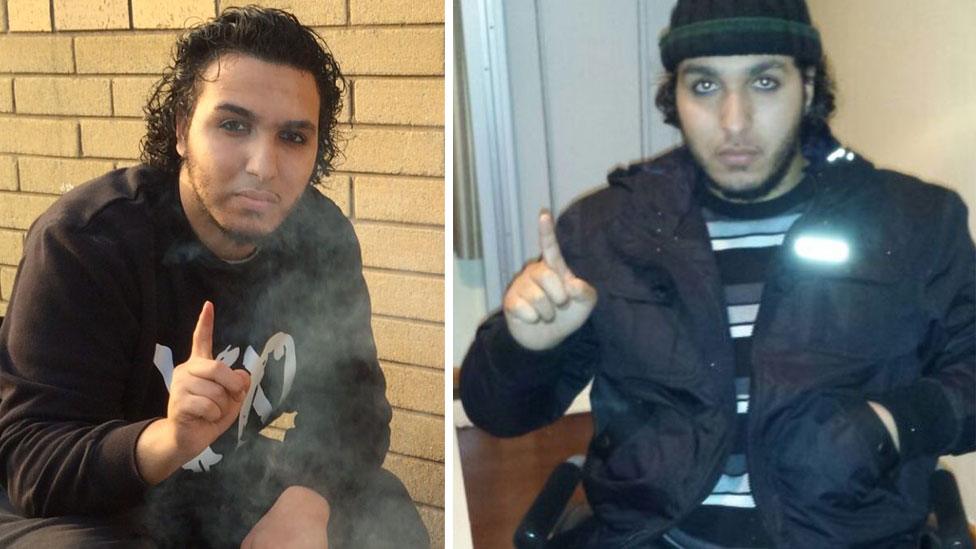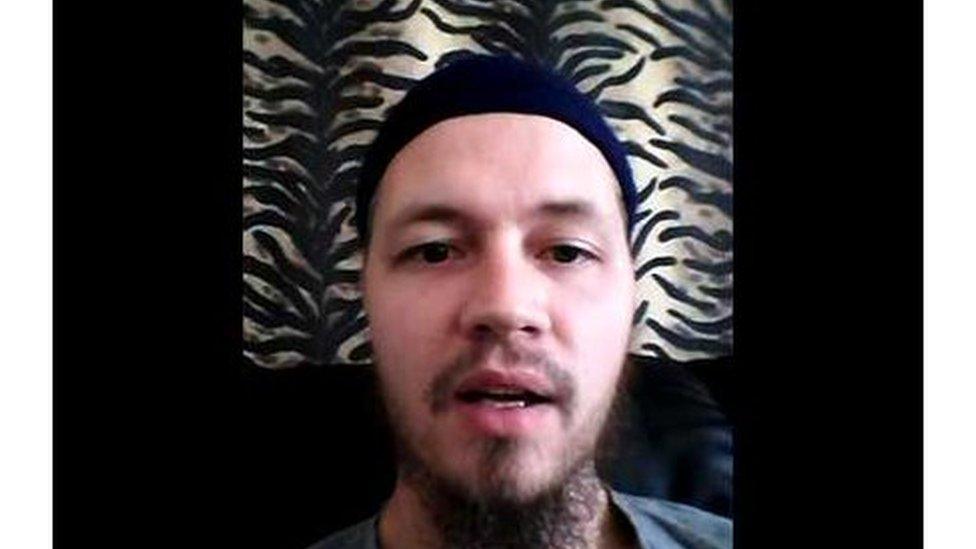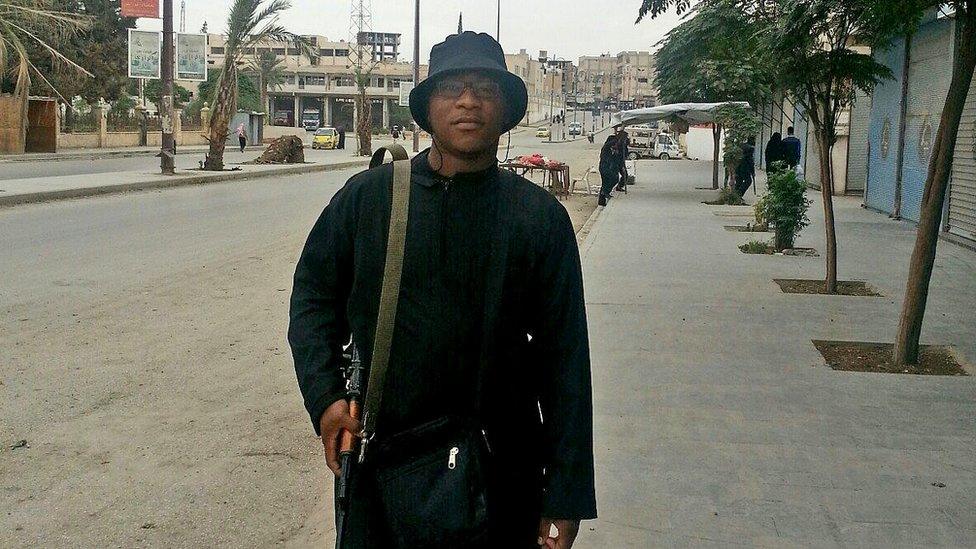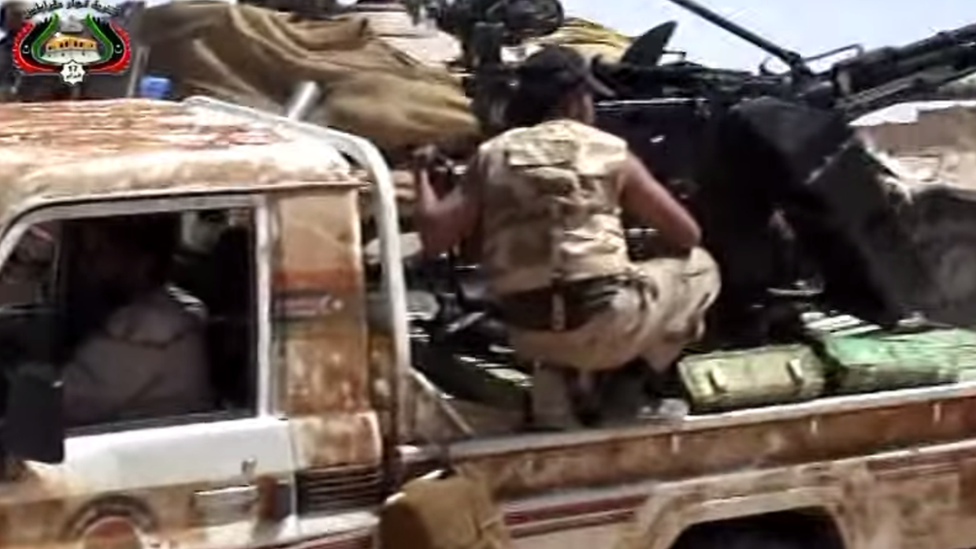Paraplegic man convicted of Syria-related terror charge
- Published

Abdal Raouf Abdallah has been in a wheelchair since he was injured in Libya at the age of 18
A British-Libyan man, left paralysed since he took part in the 2011 Libyan uprising, has been convicted of trying to help an RAF veteran travel to Syria to fight with militants there.
Abdal Raouf Abdallah, 23, from Manchester, had denied two counts of preparing acts of terrorism.
Former serviceman Stephen Mustafa Gray, who tried and failed to reach Syria, admitted three offences last year.
The court heard Abdallah had tried to arrange firearms and cash for the trip.
A jury at Woolwich Crown Court convicted Abdallah by a majority of 10 to two of two counts of preparing acts of terrorism through the help he gave to Gray, Abdallah's own brother Mohammed and two other men.
Gray pleaded guilty last year - but details of his conviction could not be reported until now. Both he and Abdallah will be sentenced together at a later date.
During his trial, Abdallah gave frank evidence about his time fighting alongside other Islamists in the Libyan uprising and supporting the principle of the armed overthrow of Syria's President Assad. He showed no emotion as the verdicts were returned.
The trial heard that Abdallah, paralysed and at home in Manchester, played a key role in arranging the journey to Syria for four men.
The court heard that he had known Gray, also from Manchester, for seven or eight years. The two had met playing football in the years before Abdallah suffered his injury.

Muslim convert Stephen Mustafa Gray served with the RAF in Iraq but returned home disillusioned by the war
The court heard that he exchanged dozens of messages with Gray over Skype, Viber and WhatsApp about the planned trip in the months running up to July 2014.
Prosecutor Max Hill QC said: "You were intent upon sending fighters to join groups in Syria who were committing terrorist acts in that country."
But during his defence, Abdallah vehemently denied having anything to do with the Islamic State group, saying that they were terrorists.
Gray had served two tours of duty in Iraq as a gunner in No 2 Squadron of the RAF Regiment, protecting airfields and aircraft. He later converted to Islam after returning home disillusioned by the war.
He and another convert, Raymond Matimba, also known as Abu Qaqa Britani Afro, left Manchester for Barcelona in July 2014 and then went on to Turkey.
Gray was turned back but prosecutors say Matimba joined the defendant's brother Mohammed and another man inside the war zone.

The court heard that Raymond Matimba did make it to Syria and sent his friends pictures from the city of Raqqa
Prosecutors told the trial that Abdallah was in constant contact with his brother and his friends through social media apps.
But Abdallah told the court that he had been in so much pain that summer from his war injuries that he had no clear recollection of events other than being a "Royal Mail messenger" who had simply passed on messages between his brother and his friends.
The court heard that Abdallah's family settled in the UK after his father, a political opponent of Colonel Gaddafi, fled the country two decades ago. Abdallah's uncle was among 1,300 people murdered by the dictator in a mass killing of political prisoners in 1996.
But in 2010, the then student travelled to Libya for a gap year and was living there with relatives when the first of the Arab Spring protests engulfed neighbouring Tunisia.

Abdallah, then aged 18, is thought to be the man on the back of this truck in TV footage taken during fighting in Libya
As demonstrations spread to Libya's capital Tripoli, he joined thousands calling for Gaddafi's fall. He was present at a major protest in Tripoli's central square when government forces opened fire, shooting dead scores of opponents.
Abdallah and his brother joined one of the most important rebel Islamist groups - the 17th February Martyr's Brigade.
Some of its members were considered to be potential enemies of the UK because of their former links to al-Qaeda.
Who's who in Libya: A guide to the fighting groups
Abdallah, who was still a teenager at that time, told his trial that he was given a key role in his platoon. He communicated with Nato personnel to ensure they were not accidentally bombed and he also manned guns mounted to pick-ups.
But he was shot twice while manning a gun during a key battle. He only survived after life-saving treatment in Germany and returned to the UK in a wheelchair.
"I was only 18 when I was shot - I never imagined it would happen to me," he told the trial. "I had plans to come back and study. But I could not cope with it."
The trial heard that Abdallah suffered from depression and further life-threatening complications on his return to the UK - but in 2014 he began facilitating the movement of friends into the Syria conflict.
While Abdallah denied any involvement in terrorism, he told the jury that they needed to understand why people wanted to overthrow President Bashar al-Assad. His brother had been motivated by a desire to help the Syrian people rid themselves of a brutal dictator, he said, and had long since returned to Tripoli to resume his normal life.
"It's got nothing to do with terrorism," he said. "We have been through the same things as the Syrians. We have worn the same shoes. To be bombed, shot at."